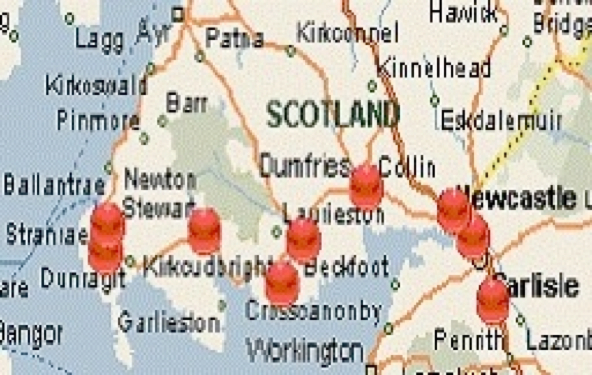EXCLUSIVE: Scots route gets EV boost 25 | 10 | 2013

THE BUSY A75, which takes traffic from the A74(M) to the ferry port at Stranraer, is to have six new rapid charging points installed for electric vehicles (as indicated in this rough illustration). The work, which will be completed before the end of 2014, is part of a project led by Nissan.
The project is named Rapid Charge Network (RCN) and was presented at the Trans European Transport Network (TEN-T) event in Tallinn, Estonia.
Backed by the European Commission, Nissan is leading a consortium which aims to install 74 rapid chargers across the UK and Ireland.
The EV-friendly rapid charge network aims to cover around 685 miles of major road routes providing links to five seaports and five international airports.
Interestingly, not one of Scotland's three main airports — Glasgow, Edinburgh or Prestwick — is included, leaving the port at Stranraer as the only site linked in the UK-wide system.
The routes included have been identified as road axes pre-defined by the UK government and the European Commission as the TEN-T corridors. In the UK this includes the M6, plus roads connecting to Felixstowe/Harwich and Stranraer/Cairnryan ports.
Related: Electric cars could save Scots £600k a day
Quite why the A75 — which is a route heavily used by HGVs and holiday traffic heading to Ireland — should be included by the government, is difficult to rationalise.
At a time when billions of pounds are being earmarked for a high-speed train service covering London-Birmingham-Leeds-Manchester, there's strong argument that introducing a fast-charging system for EVs the full length of the A74(M) to Glasgow would be an attractive proposition.
The logging then would be to also extend it the length of the M8 between Glasgow and Edinburgh, thus linking the spine of England with the spine of Scotland.
The important aspect thigh is that at least a part of Scotland has been included.
The new charging points will mean electric vehicle charging times will be dramatically reduced by the rapid chargers, down from up to eight hours to 30 minutes.
Related: Electric Ford Focus on sale in Scotland
Funding for the RCN project is being led by Nissan and is co‑financed by the EU through the TEN-T programme, with further contributions from fellow consortium members Renault, BMW and Volkswagen, plus ESB, Ireland's Electricity Supply Board.
It also draws on the network expertise of Zero Carbon Futures and Newcastle University.
Running on two priority road axes on the mainland, the network will link major ports and cities including Stranraer, Liverpool, Holyhead, Birmingham, Felixstowe, Leeds and Kingston upon Hull, with connections to existing networks in Dublin and Belfast in Eire and Northern Ireland.
The network will also be used to gather strategic information from users, including customer charging behavior and changes in mobility patterns, to help plan the roll-out future rapid charging infrastructure in member states across Europe.
Related: Scots plug-in car sales fail to take off
Keep up-to-date with all the latest news by following us on twitter.com/scotcars
Jim McGill